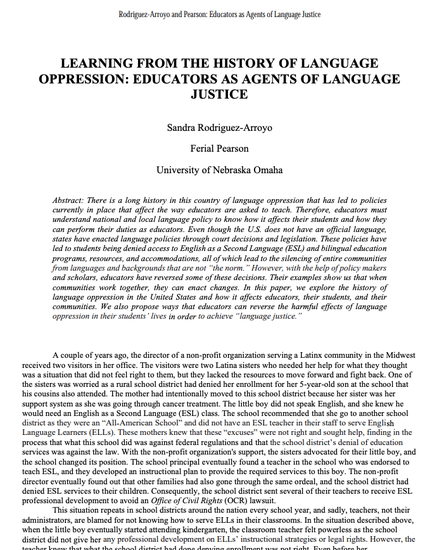
Article
Learning from the History of Language Oppression: Educators as Agents of Language Justice
Journal of Curriculum, Teaching, Learning, and Leadership in Education
(2020)
Abstract
There is a long history in this country of language oppression that has led to policies currently in place that affect the way educators are asked to teach. Therefore, educators must understand national and local language policy to know how it affects their students and how they can perform their duties as educators. Even though the U.S. does not have an official language, states have enacted language policies through court decisions and legislation. These policies have led to students being denied access to English as a Second Language (ESL) and bilingual education programs, resources, and accommodations, all of which lead to the silencing of entire communities from languages and backgrounds that are not “the norm.” However, with the help of policy makers and scholars, educators have reversed some of these decisions. Their examples show us that when communities work together, they can enact changes. In this paper, we explore the history of language oppression in the United States and how it affects educators, their students, and their communities. We also propose ways that educators can reverse the harmful effects of language oppression in their students’ lives in order to achieve “language justice.”
Keywords
- language oppression,
- language policy,
- language justice,
- assimilationist discourses,
- pluralistic discourses
Disciplines
Publication Date
Winter December, 2020
Citation Information
Sandra Rodriguez-Arroyo and Ferial Pearson. "Learning from the History of Language Oppression: Educators as Agents of Language Justice" Journal of Curriculum, Teaching, Learning, and Leadership in Education Vol. 5 Iss. 1 (2020) p. 28 - 37 Available at: http://works.bepress.com/srarroyo/12/
